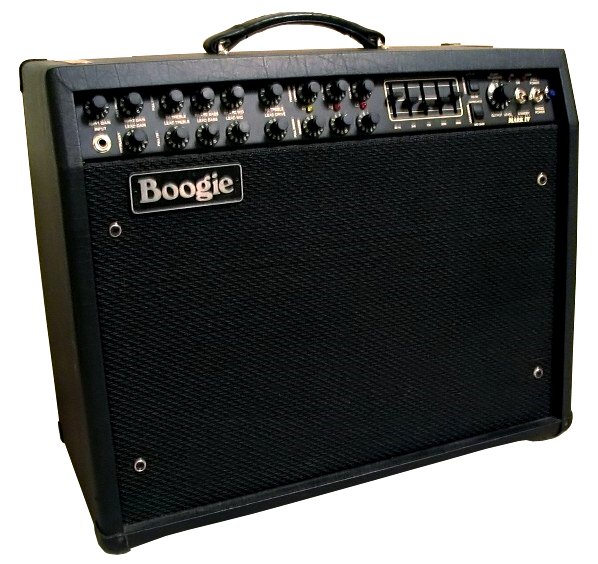|
Mesa Boogie
Mesa/Boogie (also known as Mesa Engineering) is an American company in Petaluma, California, that manufactures amplifiers and other accessories for guitars and basses. It has been in operation since 1969. Mesa was started by Randall Smith as a small repair shop which modified Fender amplifiers, particularly the diminutive Fender Princeton. Smith's modifications gave the small amps much more input gain, making them much louder as well as creating a high-gain, distorted guitar tone. Prominent early customers included Carlos Santana, and Ron Wood and Keith Richards of The Rolling Stones. Exposure from these top players helped to establish Mesa/Boogie's position on the market, and it is frequently referred to as the first manufacturer of boutique amplifiers. History Early life Randall Smith was born into a musical family in Berkeley, California in 1946. His mother and sister played piano and his father was the first-chair clarinet with the Oakland Symphony Orchestra, played tenor ... [...More Info...] [...Related Items...] OR: [Wikipedia] [Google] [Baidu] |
Subsidiary
A subsidiary, subsidiary company or daughter company is a company owned or controlled by another company, which is called the parent company or holding company. Two or more subsidiaries that either belong to the same parent company or having a same management being substantially controlled by same entity/group are called sister companies. The subsidiary can be a company (usually with limited liability) and may be a government- or state-owned enterprise. They are a common feature of modern business life, and most multinational corporations organize their operations in this way. Examples of holding companies are Berkshire Hathaway, Jefferies Financial Group, The Walt Disney Company, Warner Bros. Discovery, or Citigroup; as well as more focused companies such as IBM, Xerox, and Microsoft. These, and others, organize their businesses into national and functional subsidiaries, often with multiple levels of subsidiaries. Details Subsidiaries are separate, distinct legal ... [...More Info...] [...Related Items...] OR: [Wikipedia] [Google] [Baidu] |
Boutique Amplifier
Boutique amplifier is a catch-all descriptor for any type of instrument amplifier that is typically hand built with the intention of being much better than the mass-produced variety offered by large companies. In the majority of cases, this is reflected in the price. Sometimes they are ''clones'' of older designs, often with minor improvements or alterations in layout or circuit design; sometimes they are new designs altogether. The boutique term are also used among effect pedals, such as the manufacturer Analog Man. History California company Mesa Boogie can lay claim to being perhaps the earliest boutique amp company: their late 1960s Mark series, based on the ubiquitous Fender Princeton "study" amp but "hot-rodded", quickly established a reputation for tone and volume, and was used by, among others, Carlos Santana. Since the advent of the boutique amp age, larger companies have released reissues of their classic designs, touting their faithfulness to the original sound and t ... [...More Info...] [...Related Items...] OR: [Wikipedia] [Google] [Baidu] |
Guitar Amplifier Manufacturers
The guitar is a fretted musical instrument that typically has six strings. It is usually held flat against the player's body and played by strumming or plucking the strings with the dominant hand, while simultaneously pressing selected strings against frets with the fingers of the opposite hand. A plectrum or individual finger picks may also be used to strike the strings. The sound of the guitar is projected either acoustically, by means of a resonant chamber on the instrument, or amplified by an electronic pickup and an amplifier. The guitar is classified as a chordophone – meaning the sound is produced by a vibrating string stretched between two fixed points. Historically, a guitar was constructed from wood with its strings made of catgut. Steel guitar strings were introduced near the end of the nineteenth century in the United States; nylon strings came in the 1940s. The guitar's ancestors include the gittern, the vihuela, the four-course Renaissance guitar, and the fi ... [...More Info...] [...Related Items...] OR: [Wikipedia] [Google] [Baidu] |
Acacia Koa
''Acacia koa'' or commonly known as koa is a species of flowering tree in the family Fabaceae. It is endemic to the Hawaiian Islands, where it is the second most common tree. The highest populations are on Hawaii, Maui and Oahu. Name The name ''koa'' in the Hawaiian language ultimately comes from Proto-Austronesian *''teRas'' meaning "core" or "ironwood"; many names referring to certain ironwood or heartwood species in Southeast Asia and Oceania such as '' Vitex parviflora'' (''tugás'' in Cebuano), '' Eusideroxylon zwageri'' (''togas'' in Tombonuwo), and ''Intsia bijuga'' (''dort'' in Palauan) descend from this root. ''Koa'' also means brave, bold, fearless, or warrior. Description Koa is a large tree, typically attaining a height of and a spread of . In deep volcanic ash, a koa tree can reach a height of , a circumference of , and a spread of . It is one of the fastest-growing Hawaiian trees, capable of reaching in five years on a good site. Leaves Initially, bipinn ... [...More Info...] [...Related Items...] OR: [Wikipedia] [Google] [Baidu] |
Electro-Voice
Electro-Voice (EV) is an American manufacturer of audio equipment, including microphones, amplifiers, and loudspeakers, focused on pro audio applications such as sound reinforcement. As a subdivision of Bosch Communications Systems Inc. since 2006, Electro-Voice markets products for use by consumers as well as small or large concert venues, broadcasting, houses of worship, and in retail situations. History On September 1, 1927, Lou Burroughs and Albert R. Kahn began a small business called Radio Engineers, servicing radio receivers in the basement of the Century Tire and Rubber Company in South Bend, Indiana. Because of the Great Depression, according to Kahn, “We found ourselves insolvent to the extent of $5,000” ($ today). They decided to focus their business on audio products. The company designed a PA system for Notre Dame football coach Knute Rockne. Rockne, who had difficulty being heard at football practices due to health problems that affected his voice, called t ... [...More Info...] [...Related Items...] OR: [Wikipedia] [Google] [Baidu] |
Altec Lansing
Altec Lansing, Inc. is a U.S. audio electronics company founded in 1927. Their primary products are loudspeakers and associated audio electronics for professional, home, automotive and multimedia applications. Engineers at Western Electric, who later formed Altec Services Company, developed the technology for motion picture sound that was introduced in 1927, with the release of '' The Jazz Singer''. Originally, Altec Services Company serviced the theater sound systems the company founders had helped develop. In 1941 the Altec Services Company purchased the nearly bankrupt Lansing Manufacturing Company and melded the two names, forming the Altec Lansing Corporation, and with the manufacturing capabilities of the former Lansing Manufacturing Company, they quickly expanded into manufacturing horn loudspeakers. In 1958 the Altec Lansing Corporation was purchased by James Ling who made it part of LTV Ling Altec. LTV spun off Altec which it loaded down with debt first. By 1974, ... [...More Info...] [...Related Items...] OR: [Wikipedia] [Google] [Baidu] |
Mesa Boogie Mark Series
The Mesa Boogie Mark Series is a series of guitar amplifier made by Mesa Engineering (more commonly known as "Mesa/Boogie"). Originally just referred to as "Boogies," the product line took on the moniker "Mark Series" as newer revisions were put into production. The Mark Series amplifier was Mesa's flagship product until the introduction of the Rectifier series, and the amplifiers are collectable. Mark I Randall Smith began Mesa/Boogie with a practical joke: he borrowed a Fender Princeton (a small 12-watt amplifier) from his friend, Barry Melton of Country Joe and the Fish, and "hotrodded" it by replacing the amplifier section with a powerful Fender Bassman amp and installing a 12-inch speaker instead of the original 10-inch. The resulting amplifier proved to be loud and successful, and Smith made more than 200 of these Princeton "Boogies"—a name allegedly provided by Carlos Santana, who is to have exclaimed "Man, that little thing really boogies!" A second important improve ... [...More Info...] [...Related Items...] OR: [Wikipedia] [Google] [Baidu] |
Lee Michaels
Lee Eugene Michaels (born Michael Olsen, November 24, 1945) is an American rock musician who sings and accompanies himself on organ, piano, or guitar. He is best known for his powerful soulful voice and his energetic virtuosity on the Hammond organ, peaking in 1971 with his Top 10 pop hit single, "Do You Know What I Mean". In 1988 he founded the Marina Del Rey-based restaurant chain Killer Shrimp which he and his family continue to operate to this day. Career Born in Los Angeles, California, United States, Michaels began his career with The Sentinals, a San Luis Obispo, California-based surf group that included drummer Johny Barbata (later of The Turtles, Jefferson Airplane and Jefferson Starship). Michaels joined Barbata in the Joel Scott Hill Trio, a group led by guitarist Joel Scott Hill. Michaels later moved to San Francisco, where he joined an early version of The Family Tree, a band led by Bob Segarini. In 1967, he signed a contract with A&M Records, releasi ... [...More Info...] [...Related Items...] OR: [Wikipedia] [Google] [Baidu] |
Fender Bassman
The Fender Bassman is a bass amplifier series introduced by Fender during 1952. Initially intended to amplify bass guitars, the 5B6 Bassman was used by musicians for other instrument amplification, including the electric guitar, harmonica, and pedal steel guitars. Besides being a popular and important amplifier in its own right, the Bassman also became the foundation on which Marshall and other companies built their high-gain tube amplifiers. History The 5B6 Bassman During 1952, the Fender 5B6 Bassman amplifier was introduced as a combo amplifier cabinet that included the amplifier chassis combined with one 15" speaker. The 1952–1954 5B6 Bassman amplifiers had two 6SC7 or 6SL7GT pre-amp tubes, two 5881 power tubes and a single 5U4G rectifier tube. It was designed to generate 26 watts at an 8 ohm impedance load, and offered a cathode-based bias. From 1952 through the spring of 1954, Fender produced approximately 660 model 5B6 Bassman amplifiers (serial numbers #0001–0660). ... [...More Info...] [...Related Items...] OR: [Wikipedia] [Google] [Baidu] |
Barry Melton
Barry "The Fish" Melton (born June 14, 1947) is the co-founder and original lead guitarist of Country Joe and the Fish and Dinosaurs. He appears on all the Country Joe and the Fish recordings and he also wrote some of the songs that the band recorded. He appeared in the films made at Monterey Pop and Woodstock, and also appeared as an outlaw in the neo-Western film, '' Zachariah,'' and other films in which Country Joe and the Fish appear. An attorney and member of the State Bar of California, Melton has maintained a criminal defense practice since 1982. Life and career Melton was born in Brooklyn, New York, United States, the son of secretary Taube "Tillie" ( Kuchuck) and James Melton, an HVAC engineer who taught at Los Angeles City College. His mother was from an East Coast Jewish family (her parents were from Odessa) and his father was from a Texas pioneer family and shares ancestry in colonial Virginia with George Washington, as well as deep roots in Ireland. Raised in Brook ... [...More Info...] [...Related Items...] OR: [Wikipedia] [Google] [Baidu] |




